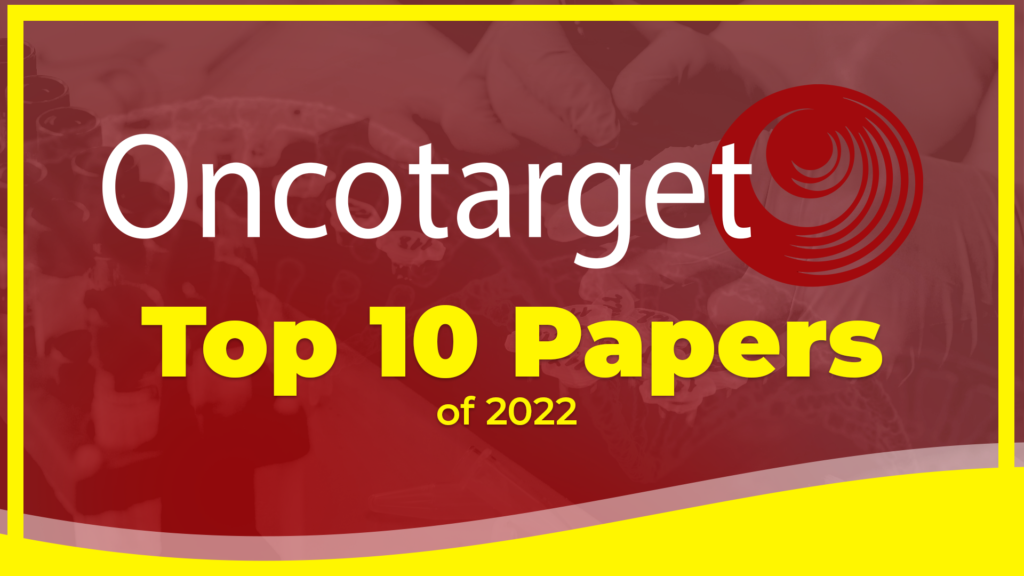Crossref is a non-profit organization that logs and updates citations for scientific publications. Each month, Crossref identifies a list of the most popular Oncotarget papers based on the number of times a DOI is successfully resolved.
Below are Crossref’s Top 10 Oncotarget DOIs published in 2023.
DOI: https://doi.org/10.18632/oncotarget.28355
Authors: Md Maksudul Alam, Janmaris Marin Fermin, Mark Knackstedt, Mackenzie J. Noonan, Taylor Powell, Landon Goodreau, Emily K. Daniel, Xiaohua Rong, Tara Moore-Medlin, Alok R. Khandelwal, and Cherie-Ann O. Nathan
Institution: LSU-Health Sciences Center
Quote: “[…] we sought to investigate the mechanism for everolimus-induced inhibition of TP53 HNSCC.”
DOI: https://doi.org/10.18632/oncotarget.28353
Authors: Noriyuki Hirahara, Takeshi Matsubara, Shunsuke Kaji, Hikota Hayashi, Yohei Sasaki, Koki Kawakami, Ryoji Hyakudomi, Tetsu Yamamoto, and Yoshitsugu Tajima
Institutions: Shimane University Faculty of Medicine and Matsue Red Cross Hospital
Quote: “In this study, the ICPI [inflammation-combined prognostic index] was devised as a novel predictive index of prognosis, and its usefulness was clarified.”
#8: Crosstalk between triple negative breast cancer and microenvironment
DOI: https://doi.org/10.18632/oncotarget.28397
Authors: Karly Smrekar, Artem Belyakov and Kideok Jin
Institution: Albany College of Pharmacy and Health Science
Quote: “[…] the study of immunotherapy for treating triple negative breast cancer might still be at its early stages of development but is full of future promise.”
#7: Systemic AL amyloidosis: current approach and future direction
DOI: https://doi.org/10.18632/oncotarget.28415
Authors: Maroun Bou Zerdan, Lewis Nasr, Farhan Khalid, Sabine Allam, Youssef Bouferraa, Saba Batool, Muhammad Tayyeb, Shubham Adroja, Mahinbanu Mammadii, Faiz Anwer, Shahzad Raza, and Chakra P. Chaulagain
Institutions: SUNY Upstate Medical University, University of Texas MD Anderson Cancer Center, Monmouth Medical Center, University of Balamand, Cleveland Clinic Ohio, UnityPoint Methodist, Houston Methodist Cancer Center, and Cleveland Clinic Florida
Quote: “AL amyloidosis is a fatal disease and systemic therapy is required to prevent deposition of amyloid in other organs and prevent progressive organ failure.”
#6: Deciphering the mechanisms of action of progesterone in breast cancer
DOI: https://doi.org/10.18632/oncotarget.28455
Authors: Gaurav Chakravorty, Suhail Ahmad, Mukul S. Godbole, Sudeep Gupta, Rajendra A. Badwe, and Amit Dutt
Institutions: Tata Memorial Centre, Homi Bhabha National Institute and MIT World Peace University
Quote: “The mechanisms underlying the observed effects of progesterone on breast cancer outcomes are unclear.”
#5: Targeting cellular respiration as a therapeutic strategy in glioblastoma
DOI: https://doi.org/10.18632/oncotarget.28424
Authors: Enyuan Shang, Trang Thi Thu Nguyen, Mike-Andrew Westhoff, Georg Karpel-Massler, and Markus D. Siegelin
Institutions: Columbia University Medical Center, City University of New York and Ulm University Medical Center
Quote: “Here, we provide a brief overview of the status quo of targeting mitochondrial energy metabolism in glioblastoma and highlight a novel combination therapy.”
#4: Selective protection of normal cells from chemotherapy, while killing drug-resistant cancer cells
DOI: https://doi.org/10.18632/oncotarget.28382
Author: Mikhail V. Blagosklonny, M.D., Ph.D.
Institution: Roswell Park Comprehensive Cancer Center
Quote: “Selective protection of normal cells may transform therapy of cancer.”
#3: The immunoregulatory protein CD200 as a potentially lucrative yet elusive target for cancer therapy
DOI: https://doi.org/10.18632/oncotarget.28354
Authors: Anqi Shao and David M. Owens
Institution: Columbia University Irving Medical Center
Quote: “CD200 expression is reported across most cancer types […]”
DOI: https://doi.org/10.18632/oncotarget.28376
Authors: Maroun Bou Zerdan, Prashanth Ashok Kumar, Elio Haroun, Nimisha Srivastava, Jeffrey Ross, and Abirami Sivapiragasam
Institutions: SUNY Upstate Medical University and Foundation Medicine, Inc.
Quote: “In breast cancer, MTAP downregulation activates ornithine decarboxylase (ODC) which in turn leads to formation of putrescine which promotes tumor migration, invasion and angiogenesis.”
#1: Using cancer proteomics data to identify gene candidates for therapeutic targeting
DOI: https://doi.org/10.18632/oncotarget.28420
Authors: Diana Monsivais, Sydney E. Parks, Darshan S. Chandrashekar, Sooryanarayana Varambally, and Chad J. Creighton
Institutions: Baylor College of Medicine and University of Alabama at Birmingham
Quote: “[…] we consider some public molecular resources, including proteomics datasets, that may be leveraged to help identify gene candidates for therapeutic targeting in cancer.”
—
Click here to read the latest papers published by Oncotarget.
—
Oncotarget is an open-access, peer-reviewed journal that has published primarily oncology-focused research papers since 2010. These papers are available to readers (at no cost and free of subscription barriers) in a continuous publishing format at Oncotarget.com. Oncotarget is indexed/archived on MEDLINE / PMC / PubMed.
Click here to subscribe to Oncotarget publication updates.
For media inquiries, please contact media@impactjournals.com.

